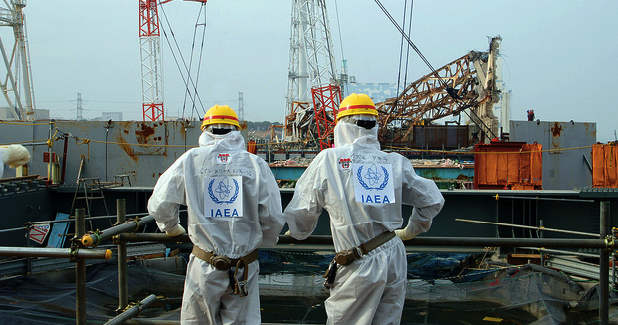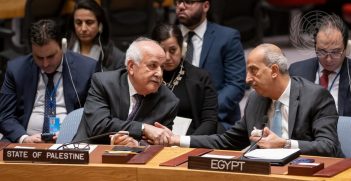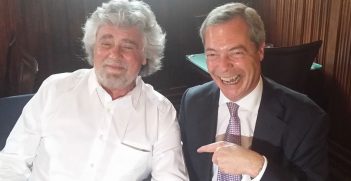IAEA: The UN's Nuclear Watchdog In Need of Care

The 168 member states of the International Atomic Energy Agency meet this week in Vienna for their 60th annual General Conference. Since the end of the Cold War, the agency has continually been tasked with more complex and sensitive roles, something it has managed with distinction. However, it is struggling for resources and increasingly under pressure from the competing interests of its expanded membership.
The credibility of the International Atomic Energy Agency (IAEA) is vital to the countries of the Asia-Pacific as it is now the epicentre of global nuclear affairs. The agency is valued most for the international security benefits offered by IAEA “safeguards”. These are the activities the agency can use to determine whether peaceful nuclear activity around the world is indeed peaceful and not nefariously being diverted to nuclear weapons. This watchdog role is performed by a small force of nuclear experts whose job it is to inspect programmes around the world.
In Southeast Asia the IAEA inspects the nuclear activities of Australia and its neighbours: those inspections help the countries in that region to mutually conclude that they do not face the threat of a nuclear armed neighbour. In North Asia it inspects the very large and sophisticated nuclear industries of Japan, South Korea and Taiwan—giving assurance that they have not acquired nuclear weapons (even as North Korea expelled the inspectors that had blown the whistle on its nuclear weapon plans). Without the IAEA and the legal basis for much of its activity, the Nuclear Non-Proliferation Treaty, the world would be a greatly more dangerous place.
Greater expectations
The IAEA has consistently demonstrated a remarkable ability to respond to new challenges since the end of the Cold War, and its list of achievements is impressive. It uncovered Iraq’s nuclear program, confirmed that North Korea was conducting clandestine nuclear activity, verified the destruction of South Africa’s nuclear weapons and supervised the removal of ex-Soviet weapons from Ukraine, Kazakhstan and Belarus. The agency’s safeguards system has also been radically strengthened. This list explains why the architects of the 2015 deal to cap Iran’s nuclear program looked to the IAEA to perform the extraordinary international inspections mandated by the agreement.
Implementing nuclear safety standards has been another achievement. The accident at the Chernobyl Nuclear Power Plant in 1986 was the trigger that led the international community to demand better safety standards around nuclear energy. Safety had hitherto been held to be the exclusive responsibility of states, but now the IAEA was asked to negotiate treaties and develop standards and peer review arrangements which have become the benchmarks of best practice. Its expertise and reputation in safety matters has made it a valuable partner in managing the consequences of the Fukushima disaster.
Like safety, nuclear security, or the prevention of nuclear materials falling into the hands of criminals and terrorists, was once also held to be an exclusively national matter. However, after the terrorist attacks of 11 September 2001, the IAEA’s role in non-proliferation has grown. This year, the Obama Administration’s fourth and final Nuclear Security Summit assigned much of the responsibility for maintaining the momentum of global action on nuclear security to the IAEA.
To further illustrate the success of the IAEA, it was ten years ago that the 50th IAEA Conference met in the glow of the Nobel Peace Prize that awarded jointly to the agency and its then Director-General Mohamed ElBaradei for contributions to international security and nuclear safety. The decade since has been tough-going for ElBaradei’s successor, Japanese diplomat Yukiya Amano, who will be seeking a third four-year term at the end of next year.
But where are the resources?
Given the value and sensitivity of the IAEA’s activities it might be surprising to learn that many (mainly the wealthier) member states have for the last three decades held its budget to zero real growth. As a result, many of the same countries now find they need to contribute substantial extra-budget funding to get what they want from the IAEA, such as inspections in Iran and programs on nuclear security.
Reliance on extra-budget funding jeopardises impartiality. This risk is mitigated in implementing safeguards by only using international staff as inspectors. However the IAEA’s safeguards research and development programs—critical to achieving the necessary levels of assurance in complex and sophisticated nuclear facilities—is dependent on voluntary contributions. The US funds much of the activity. Japan, ROK and China also contribute strongly. Australia once had a robust support program, but current contributions are much reduced.
The reliance on voluntary funding is even more acute with nuclear security activities where most staff and almost all practical support activity depends on extra-budget funding, reinforcing perceptions that these activities are solely for the benefit of the major nuclear players.
The growth in safeguards, safety and security has generated pressure for correspondingly more resources for technical assistance to benefit developing countries. The IAEA is an effective deliverer of specialised assistance in a range of fields where nuclear science and technology can contribute, and should attract more aid funds. Its joint program with the Food and Agricultural Organisation provides assistance in applying isotopic techniques to protect plants from insect pests and to breed new improved plant varieties. It is also helping developing countries tackle cancer through use of nuclear medical techniques, radiation oncology and radiology facilities.
What needs to be done?
First, all IAEA member states should recommit to the spirit of the IAEA as an independent and expert technical specialised agency serving the vital interests of its members. In its governance, the IAEA has indeed become more ‘political’. Where once the Board of Governors comprised heads of national atomic energy commissions, it now comprises mostly generalist diplomats, though often supported by technical and policy experts. The 2,500 strong Secretariat remains highly professional and largely technical but it is not immune to the changed environment. Member states must take a lead in upholding the integrity of the Secretariat.
Second, Asia-Pacific countries should commit greater support for IAEA safeguards. Steps that could be taken include financial as well as in-kind support for the development of inspection equipment, data analysis and the provision of information to improve the effectiveness of IAEA inspections. Australia specifically should restore its support to former levels.
Third, we should support the safeguards work in Iran. The job is sensitive enough without funding issues and unilateral commentary from member states. The Secretariat has been accused of withholding information on its inspections in Iran. To overcome this we might best express confidence in the integrity of the inspectors, and the importance of information security as expected by the Director General.
Fourth, Asia-Pacific should seek an improvement in the IAEA’s financial situation ensuring budget funding for all core activity including new nuclear security work, and adequate levels of technical cooperation including through the Director General’s attempts to foster novel funding partnerships. Aid agencies should look again at the efficacy of the IAEA as a modest but technically sound and efficient provider of specialised technical assistance.
Fifth, high level member state commitment to the IAEA is essential. This December the IAEA is hosting a meeting to plan follow-ups to the Nuclear Security Summits. The aim is to have delegations led at ministerial level. Asia-Pacific governments, especially those that participated in the summits, should take the lead in ensuring the success of that conference and commit to the steps necessary to provide the nuclear security program with a sound financial base.
Finally, it is in the interests of our region and the broader membership that we support Yukiya Amano for a further, final term as Director General, and help him better position the IAEA to meet the challenges of the Asia-Pacific century.
John Tilemann is a former career diplomat with the Australian Department of Foreign Affairs and Trade. John was the Deputy Australian Resident Representative to the IAEA between 1987 and 1990. He was Chief of Staff to IAEA Director-Generals Hans Blix and Mohamed ElBaradei from 1992-98. John is currently the Director of Research for the Asia Pacific Leadership Network on Nuclear Non-Proliferation and Disarmament.
This article is published under a Creative Commons Licence and may be republished with attribution.





